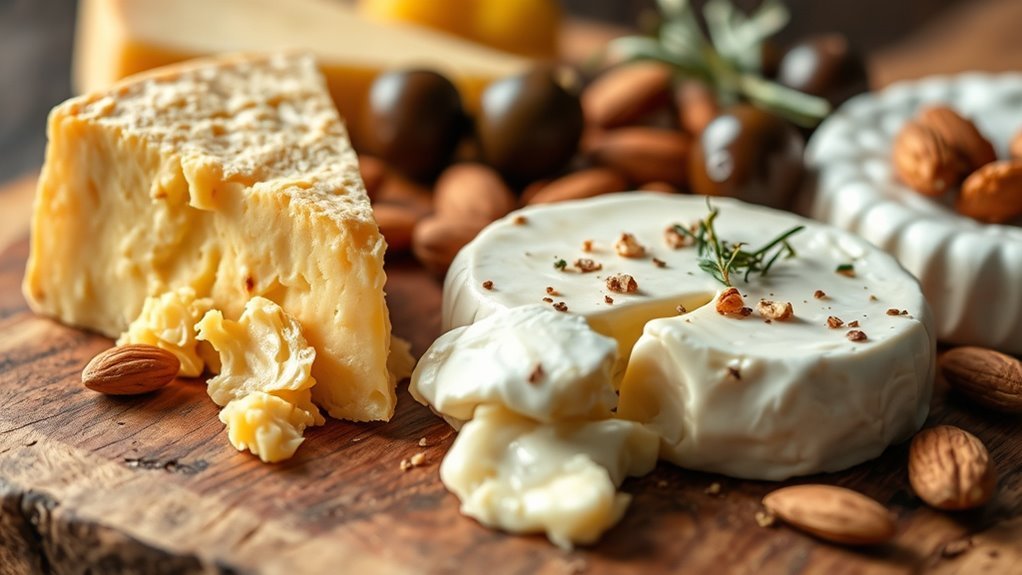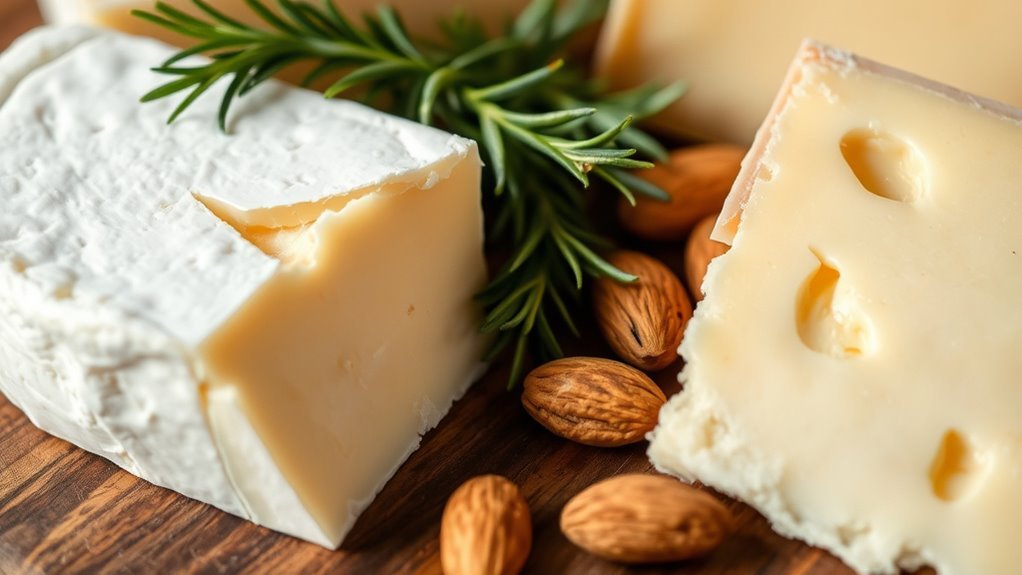Yes, you can definitely eat cheese on a keto diet! Cheeses like cheddar, mozzarella, cream cheese, and goat cheese are low in carbs and high in healthy fats. These choices can help support your keto goals while providing essential nutrients. Just remember to stick to the recommended serving size of 1-2 ounces per day and be mindful of any lactose intolerance. If you’re curious about creative ways to incorporate cheese into your meals, there’s even more to explore!
Understanding the Nutritional Value of Cheese

Cheese is a staple in many diets, and its nutritional value makes it a particularly appealing choice for those following a keto diet. With a wide range of cheese varieties available, you can find options that not only fit your taste preferences but also align with your dietary needs. Nutritional benefits of cheese include high protein content, essential vitamins, and healthy fats, contributing to satiety and energy levels. Varieties such as cheddar, mozzarella, and cream cheese are low in carbohydrates, making them suitable for keto. Additionally, cheese contains calcium and probiotics, supporting bone health and gut function. As you explore your options, remember that moderation is key to reaping these benefits while enjoying the freedom of a diverse diet.
Best Types of Cheese for a Keto Diet

When you’re steering through the keto diet, selecting the right types of cheese can greatly enhance your meal options while keeping your carbohydrate intake low. Some of the best cheese varieties include cheddar, mozzarella, cream cheese, and goat cheese. These options are not only low in carbs but also high in fat, which is essential for your keto success. Each cheese brings unique flavor profiles—sharp cheddar adds a robust taste, while mozzarella offers a mild, creamy texture. Cream cheese is perfect for spreads or desserts, and goat cheese can elevate salads with its tanginess. Embracing these cheeses can provide culinary freedom, allowing you to enjoy satisfying meals while adhering to your keto lifestyle without feeling restricted.
Portion Control: How Much Cheese Can You Have?

How much cheese can you enjoy on a keto diet without overstepping your carbohydrate limits? Generally, sticking to about 1-2 ounces of cheese servings per day is a good rule of thumb. Different cheeses have varying carb counts, so it’s essential to check labels. For instance, cheddar has around 1 gram of carbs per ounce, while softer cheeses like mozzarella can be slightly higher. Keep your total daily carb intake under 20-50 grams, depending on your personal goals, and factor in cheese as part of that limit. It’s all about balance and moderation. By being mindful of your cheese servings, you can relish the creamy goodness while staying true to your keto journey. Enjoy the freedom of cheese—just keep it in check!
Creative Ways to Incorporate Cheese Into Your Meals
While you might think of cheese as just a snack or topping, there are plenty of creative ways to incorporate it into your keto meals. Try adding cheese to your favorite low-carb soups for a creamy texture or mixing it into casseroles for extra flavor. Cheese recipes like zucchini lasagna or cauliflower mac and cheese can satisfy your cravings without derailing your diet. Don’t forget about cheese pairings; combining cheeses like goat cheese with roasted veggies or mozzarella with fresh basil can elevate your dishes. You can even whip up cheese crisps as a crunchy snack or use cream cheese in your keto desserts. These ideas not only enhance taste but also keep your meals exciting and satisfying.
Potential Concerns: Lactose Intolerance and Other Issues
Although cheese can be a delicious addition to your keto diet, it’s important to assess potential concerns such as lactose intolerance and other digestive issues. Many individuals are lactose intolerant, meaning they lack the enzyme needed to properly digest lactose, the sugar found in milk products. Consuming cheese might lead to symptoms like bloating, gas, or diarrhea. It’s worth noting that some cheeses, particularly aged varieties, contain lower lactose levels and may be better tolerated. However, if you experience discomfort, it’s wise to evaluate alternatives like lactose-free cheese or non-dairy options. Listening to your body will empower you to enjoy your keto journey while minimizing any negative effects related to dairy consumption.
Frequently Asked Questions about Eating Cheese on the Keto Diet
1. Can I eat cheese while on a keto diet?
Yes, cheese can be a great addition to a keto diet. Most cheeses are low in carbohydrates and high in fats, which makes them suitable for maintaining ketosis. However, it’s important to choose full-fat cheeses and monitor portion sizes to stay within your daily carb limit.
2. What types of cheese are best for a keto diet?
The best types of cheese for a keto diet include cheddar, mozzarella, cream cheese, goat cheese, and blue cheese. These cheeses are typically low in carbohydrates and high in fat, making them excellent choices for keto enthusiasts. It’s advisable to opt for natural cheeses rather than processed varieties, which may contain added sugars and carbs.
3. How much cheese can I eat on a keto diet?
While cheese can be included in moderation on a keto diet, portion control is key. Generally, it’s recommended to consume between 1 to 2 ounces of cheese per day, depending on your overall daily carb intake. Always check the nutritional information on the packaging to ensure it fits within your macros.
4. Are there any downsides to eating cheese on a keto diet?
While cheese is low in carbs, it can be high in calories and saturated fats. Overconsumption may lead to weight gain or digestive issues for some individuals, particularly those who are lactose intolerant. It’s important to listen to your body and adjust your intake based on how you feel and your dietary goals.
5. Can cheese affect ketosis?
Cheese generally does not negatively affect ketosis when consumed in moderation. Its low carbohydrate content helps maintain the state of ketosis, but if consumed in excess, the calories and fats from cheese could lead to weight gain, which may hinder your keto goals. Always track your overall food intake to ensure you stay within your desired macronutrient ratios.
References
- https://www.ncbi.nlm.nih.gov/pmc/articles/PMC6520976/
- https://www.healthline.com/nutrition/keto-diet-food-list#dairy
- https://www.webmd.com/diet/obesity/keto-diet-what-to-eat-and-avoid
- https://www.mayoclinic.org/healthy-lifestyle/nutrition-and-healthy-eating/expert-answers/keto-diet/faq-20456330
- https://www.verywellfit.com/what-is-the-keto-diet-4685487
- https://www.dietdoctor.com/low-carb/keto/cheese
- https://www.reuters.com/article/us-health-keto-diet-idUSKBN2A40ZJ


